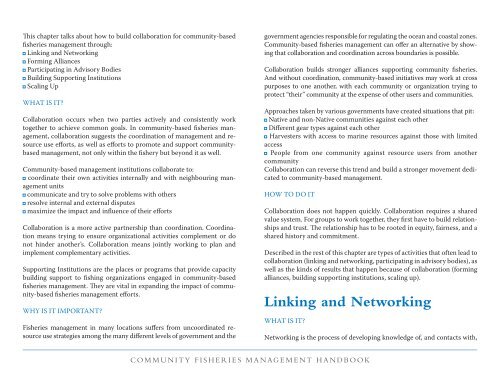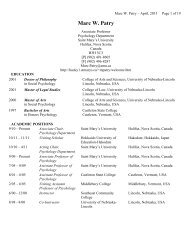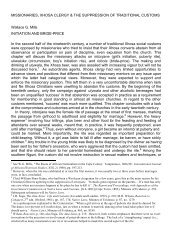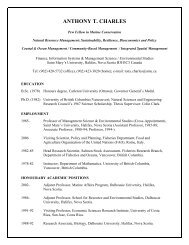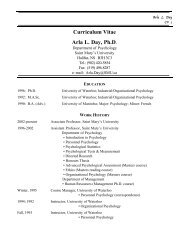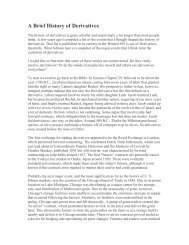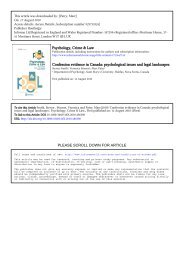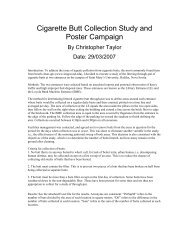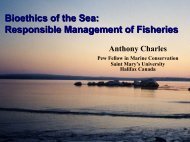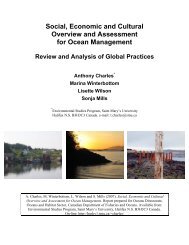Community Fisheries Management Handbook - Saint Mary's University
Community Fisheries Management Handbook - Saint Mary's University
Community Fisheries Management Handbook - Saint Mary's University
You also want an ePaper? Increase the reach of your titles
YUMPU automatically turns print PDFs into web optimized ePapers that Google loves.
This chapter talks about how to build collaboration for community-based<br />
fisheries management through:<br />
Linking and Networking<br />
Forming Alliances<br />
Participating in Advisory Bodies<br />
Building Supporting Institutions<br />
Scaling Up<br />
WHAT IS IT?<br />
Collaboration occurs when two parties actively and consistently work<br />
together to achieve common goals. In community-based fisheries management,<br />
collaboration suggests the coordination of management and resource<br />
use efforts, as well as efforts to promote and support communitybased<br />
management, not only within the fishery but beyond it as well.<br />
<strong>Community</strong>-based management institutions collaborate to:<br />
coordinate their own activities internally and with neighbouring management<br />
units<br />
communicate and try to solve problems with others<br />
resolve internal and external disputes<br />
maximize the impact and influence of their efforts<br />
Collaboration is a more active partnership than coordination. Coordination<br />
means trying to ensure organizational activities complement or do<br />
not hinder another’s. Collaboration means jointly working to plan and<br />
implement complementary activities.<br />
Supporting Institutions are the places or programs that provide capacity<br />
building support to fishing organizations engaged in community-based<br />
fisheries management. They are vital in expanding the impact of community-based<br />
fisheries management efforts.<br />
WHY IS IT IMPORTANT?<br />
<strong>Fisheries</strong> management in many locations suffers from uncoordinated resource<br />
use strategies among the many different levels of government and the<br />
government agencies responsible for regulating the ocean and coastal zones.<br />
<strong>Community</strong>-based fisheries management can offer an alternative by showing<br />
that collaboration and coordination across boundaries is possible.<br />
Collaboration builds stronger alliances supporting community fisheries.<br />
And without coordination, community-based initiatives may work at cross<br />
purposes to one another, with each community or organization trying to<br />
protect “their” community at the expense of other users and communities.<br />
Approaches taken by various governments have created situations that pit:<br />
Native and non-Native communities against each other<br />
Different gear types against each other<br />
Harvesters with access to marine resources against those with limited<br />
access<br />
People from one community against resource users from another<br />
community<br />
Collaboration can reverse this trend and build a stronger movement dedicated<br />
to community-based management.<br />
HOW TO DO IT<br />
Collaboration does not happen quickly. Collaboration requires a shared<br />
value system. For groups to work together, they first have to build relationships<br />
and trust. The relationship has to be rooted in equity, fairness, and a<br />
shared history and commitment.<br />
Described in the rest of this chapter are types of activities that often lead to<br />
collaboration (linking and networking, participating in advisory bodies), as<br />
well as the kinds of results that happen because of collaboration (forming<br />
alliances, building supporting institutions, scaling up).<br />
Linking and Networking<br />
WHAT IS IT?<br />
Networking is the process of developing knowledge of, and contacts with,<br />
C O M M U N I T Y F I S H E R I E S M A N AG E M E N T H A N D B O O K


